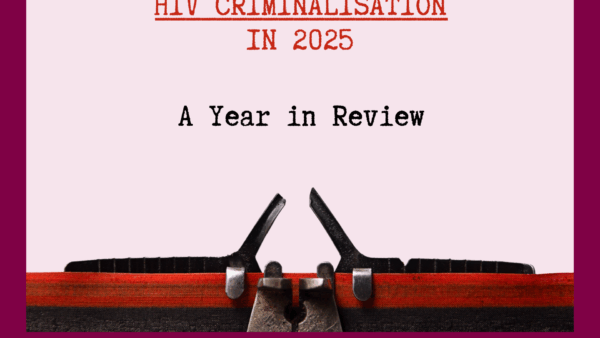
Activists in Tamaulipas denounce that criminalisation of HIV is an obstacle to health and human rights
Translated with Deepl. For original article in Spanish, please scroll down.
Cd. Victoria, Tamaulipas.- People living with HIV in the state of Tamaulipas face not only the challenge of their health condition, but also the threat of criminalisation. Furthermore, Article 203 of the state penal code allows anyone to report another person for ‘risk of contagion’, which generates fear, discrimination and hinders prevention and early detection efforts.
Celso Pérez Ruiz, president of the civil association ‘Tendremos Alas’ (We Will Have Wings), denounced that this legislation discourages citizens from getting tested for HIV, as the fear of being singled out and prosecuted outweighs the need to know their health status.
‘In Tamaulipas, people living with HIV continue to be criminalised, and the current policy of prevention and early detection cannot move forward precisely because there is a law that criminalises them; so who is going to want to get tested for HIV under the fear of being reported if they test positive?’
He recalled that despite the fact that the Supreme Court of Justice of the Nation and the National Human Rights Commission have declared the law unconstitutional, the state has refused to repeal it.
In the last legislative session, Morena deputy Magaly de Andar presented an initiative to eliminate this article, but in her current term she has not followed up on it, leaving thousands of Tamaulipas residents in a situation of legal vulnerability.
This is not just a legal issue, it is a human rights issue. The criminalisation of HIV perpetuates stigma, alienates those living with HIV from health services and prevents them from exercising their right to a dignified life free from discrimination. It is time for Tamaulipas to move towards fairer and more humane legislation.
‘Article 203 of the Tamaulipas state criminal code criminalises people living with HIV, regardless of their sexual orientation or gender identity. All Tamaulipas residents living with the virus are under the premise that they can be reported by anyone for the risk of contagion,’ said Celso Pérez Ruiz.
Cd. Victoria, Tamaulipas.- En el estado de Tamaulipas viven con VIH enfrentan no solo el desafío de su condición de salud, sino también la amenaza de criminalización; además, el artículo 203 del código penal estatal permite que cualquier persona denuncie a otra por «peligro de contagio», lo que genera miedo, discriminación y obstaculiza los esfuerzos de prevención y detección oportuna.
Celso Pérez Ruiz, presidente de la asociación civil “Tendremos Alas”, denunció que esta legislación disuade a los ciudadanos de hacerse pruebas de VIH, pues el temor a ser señalados y perseguidos legalmente pesa más que la necesidad de conocer su estado de salud.
“En Tamaulipas se sigue criminalizando a las personas que viven con VIH, y la actual política de prevención y detección oportuna no puede avanzar precisamente porque hay una ley que criminaliza; entonces qué persona va a querer hacerse una prueba de VIH bajo el temor de que sea boletinada en caso de dar positivo”.
Recordó que a pesar de que la Suprema Corte de Justicia de la Nación y la Comisión Nacional de los Derechos Humanos han declarado la norma como inconstitucional, el estado se ha resistido a derogarla.
En la pasada legislatura, la diputada de Morena Magaly de Andar presentó una iniciativa para eliminar este artículo, pero en su actual gestión no le ha dado seguimiento, dejando a miles de tamaulipecos en una situación de vulnerabilidad legal.
Este no es solo un tema legal, es una cuestión de derechos humanos. La criminalización del VIH perpetúa el estigma, aleja a quienes lo viven de los servicios de salud y les impide ejercer su derecho a una vida digna y libre de discriminación. Es hora de que Tamaulipas avance hacia una legislación más justa y humana.
“El artículo 203 del código penal del estado de Tamaulipas criminaliza a las personas que viven con VIH, más allá de su orientación sexual o de identidad de género. Todos los tamaulipecos que vivan con el virus están bajo la premisa de que pueden ser denunciados por peligro de contagio por cualquier persona”, refirió Celso Pérez Ruiz.









